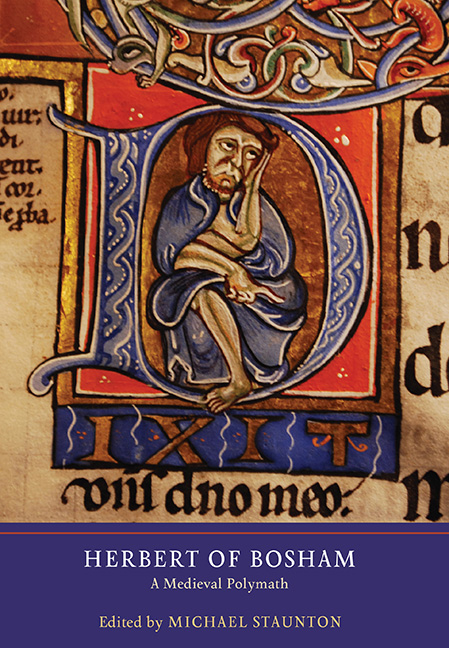Book contents
- Frontmatter
- Contents
- List of Illustrations
- List of Contributors
- Editorial Preface
- List of Abbreviations
- 1 An Introduction to Herbert of Bosham
- 2 Master Herbert: Becket's eruditus, Envoy, Adviser, and Ghost-writer?
- 3 Herbert of Bosham and Peter Lombard
- 4 Pages Covered with as Many Tears as Notes: Herbert of Bosham and the Glossed Manuscripts for Thomas Becket
- 5 Scholarship as a Weapon: Herbert of Bosham's Letter Collection
- 6 Time, Change and History in Herbert of Bosham's Historia
- 7 John Allen Giles and Herbert of Bosham: The Criminous Clerk as Editor
- 8 The Missing Leaves of Arras MS 649: A Tale of Lost and Found
- 9 Encounters with Herbert of Bosham
- Appendix: A New Letter of Herbert of Bosham (1175 x 1178)
- Select Bibliography
- Index
5 - Scholarship as a Weapon: Herbert of Bosham's Letter Collection
Published online by Cambridge University Press: 26 March 2019
- Frontmatter
- Contents
- List of Illustrations
- List of Contributors
- Editorial Preface
- List of Abbreviations
- 1 An Introduction to Herbert of Bosham
- 2 Master Herbert: Becket's eruditus, Envoy, Adviser, and Ghost-writer?
- 3 Herbert of Bosham and Peter Lombard
- 4 Pages Covered with as Many Tears as Notes: Herbert of Bosham and the Glossed Manuscripts for Thomas Becket
- 5 Scholarship as a Weapon: Herbert of Bosham's Letter Collection
- 6 Time, Change and History in Herbert of Bosham's Historia
- 7 John Allen Giles and Herbert of Bosham: The Criminous Clerk as Editor
- 8 The Missing Leaves of Arras MS 649: A Tale of Lost and Found
- 9 Encounters with Herbert of Bosham
- Appendix: A New Letter of Herbert of Bosham (1175 x 1178)
- Select Bibliography
- Index
Summary
HERBERT of Bosham's letter collection would be totally lost if it were not for a single fourteenth-century copy, today in Cambridge, Corpus Christi College MS 123, fols. 1r–64v. It consists of forty-eight letters and letter fragments. Only partially edited by J. A. Giles in the mid-nineteenth century, the letters, which are written in complex and flowery Latin, have been largely neglected, although some of them were included by Robertson in the Materials for the History of Archbishop Thomas Becket. Anne Duggan has established with great clarity the (limited) contribution that the collection makes to the much greater body of the Becket correspondence. Eleven letters are presented as drafted by Herbert ‘in persona Thomae’, but for most of them it is difficult to say that they were ever actually sent. Only two appear in the main Becket collections, with textual differences from the text extant in the Herbert collection. Two letters drafted by Herbert seem to have been rejected by the archbishop and a parallel version actually sent. Another three may have been actually sent, although Anne Duggan did not include them in her edition.
However, the letters written on behalf of Becket constitute only a small part of the collection as we have it. There are also twenty letters written in Herbert's own name, as well as three letters sent to him. There is an intriguing addition: Ne in dubium, the text of the settlement established at Avranches in 1172 between Henry II and the papacy. The last extant element in the collection is a fragment completely ignored by Giles, probably because it bears no rubric or other obvious identifiable feature.
Herbert's letters have been overlooked for centuries, and the few people who have taken notice were not always won over. The Latin in which the letters are composed is difficult and convoluted, and they are long winded. They were also edited by a man who had, both literally and metaphorically, little time for them. As Nicholas Vincent shows in another chapter, Giles had to go fast when he edited the letters, and he had other concerns on his mind. This accounts for the frequent transcription mistakes, but not necessarily for Giles's decision to discard about a quarter of the collection.
- Type
- Chapter
- Information
- Herbert of BoshamA Medieval Polymath, pp. 87 - 103Publisher: Boydell & BrewerPrint publication year: 2019



